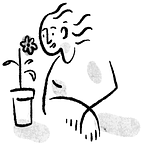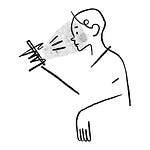There’s one little thing I recommend for your daily routine that has nothing to do with “getting things done” or being productive. And I recommend it even in “normal” life, when we’re not social-distancing or otherwise going through a global pandemic.
Tsh’s free weekly email, 5 Quick Things
Andrea on Instagram
Andrea’s website
For 30% off your first month’s subscription, visit mylola.com and enter thegoodlist when you subscribe.
Get 25% off when you go to LiquidIV.com and use code GOODLIST at checkout.
This is The Good List — I’m Tsh Oxenreider.
This is a habit.
I’ve had several iterations of what I’d call “normal” life. I’ve gone to an office for a full-time job here and there in the 25 years since I entered the work world at age 16, but that’s been more the exception than the rule. My longer stints involve work that looks more like teaching English, either here in my home culture or abroad cross-culturally, working for non-profits on the ground in developing countries, running a small digital business from home, working from home as a writer, and of course, parenting children (along with homeschooling them here and there). Most of my working career hasn’t really been about the whole M-F, 9-5 cubicle life.
All these gigs have had vastly different perks, pros, and cons, but the one thing they all have in common, despite their loosey-gooseyness, is this: I work much better in each of these environments when I create for myself a dependable routine. Nothing rock-hard and immovable (because that never works for me, either), but some semblance of a predictable flow to my day, where I create either themes to my days or a pattern of tasks and projects. This sort of self-imposed routine provides me some much-needed scaffolding to an otherwise wide-open day, when I still have a long list of things to do, but without someone else dictating when and how I should do it. I’ve learned over the years that I just don’t do so well when I assume I’ll figure it out and fly by the seat of my pants every morning. I need a semblance of predictability to my often creative, almost always project-oriented work, many times when I’m my own boss.
This routine changes frequently, depending on my work and my stage of life, and it works best when I listen to what my life is telling me in the moment that it needs, as opposed to forcing it to fit in an “ideal” schedule that actually doesn’t take reality into account. Which is why in this episode, I’m not here to tell you an ideal way to set up a daily routine. That’s up to you and your situation.
But if you’re listening to this as it goes out in the world, you know that we’re in the middle of a worldwide pandemic called Coronavirus, and there’s hardly a nook or cranny in the world that isn’t affected by this. Our regular lives are on pause as we figure this out on a global scale — so, our usual places of business, education, worship, and community are largely closed, and our rhythm of life that we may be accustomed to is one giant question mark. It feels really weird, doesn’t it? In my lifetime, I can’t remember a time when everything felt so unpredictable and unknown, not just a day at a time, but by the hour. It’s hard to plan much of anything right now, right? And if you’re like my family, plans have been flat-out canceled: we had trips on the horizon, my daughter’s musical was postponed to the end of the school year, and it’s even hard to know what’s on deck for the summer a few months from now. There’s a certain solidarity to this unpredictability, in that we’re ALL in this weird boat. It’s a very surreal moment we’re living in right now.
Well, it’s this very unpredictability that forces me to lean all the more heavily into my self-imposed daily and weekly rhythm, as best as I can, of course (coupled with kids being home for the foreseeable future). And it’s that rhythm to my days that provide a semblance of certainty in uncertain times. I’m grateful for it, and I highly recommend it for yourself, if you find yourself suddenly working from home and you’re not quite sure how to go about it.
But there’s one other thing I also recommend for your daily rhythm that has nothing to do with “getting things done” or being productive. And I recommend it even in “normal” life, when we’re not quarantined or practicing social-distancing or otherwise going through a global pandemic. In fact, I’ve had this episode’s topic on my editorial calendar for months now, so I recommend exploring what this habit looks like for you even if you’re listening to this long after the pandemic has passed.
And it’s the habit of incorporating a little something called a “daily golden hour” into your days — no matter where you work, what you do for a living, how you spend your free time, whether you have kids, or how old you are. A daily golden hour is a little sliver of delight that can work infinitely different ways no matter what kind of life you live — and while it’s great during normal life, I can’t help but realize how much more necessary it is right now, when so many of us are having to self-impose a new rhythm and routine to our days in the midst of serious unpredictability.
What do I mean by a “daily golden hour”? Well, I’m glad you asked, because I’m here to tell you about it, and why I think it’s a great habit for you to incorporate into your life — right after this short break. So hang tight; I’ll be right back.
Alright, we’re back. A daily golden hour — what do I mean by that? Well, I first started exploring this idea in my own life when I started feeling burned out by my to-do list. As someone who’s both self-employed and who works from home by myself, my work life can largely end up looking like little more than a long series of tasks, day after day. Even as someone in a creative field like writing, podcasting, and coaching, I can start feeling the malaise of work that’s ultimately broken down into a long series of tasks — email, making decisions, Slack, and the like. Especially when it’s all done via a screen, virtually, it can start to mess with my head and energy levels.
So then I started thinking about Google’s longstanding, well-known policy of providing its employees with a set amount of time to work on their own projects and ideas — it’s called their 20% policy. Basically, reportedly Google allows and encourages their employees to spend 20% of their time exploring innovations and ideas that interest them, even if they’re out of their job description or normal wheelhouse. This does two things: it increases employee satisfaction, and it's led to new ideas that otherwise might never have happened.
I wondered to myself, what would it look like if I imposed a 20% policy on myself? Sure, I’m technically my own boss, but the reality is I have an agenda I need to accomplish in order to be responsible and productive. Day after day of this, and I too can feel the need to spend even a little bit of my time doing something else, exploring some other interest.
So, I started calling this a golden hour — around one hour when I could do whatever I wanted in my work. Now, I’m not talking about rest, because that’s a real thing, too, and that’s essential to any good day, for sure. I’m talking about work here, doing something — but without any agenda other than following my own interests.
One hour is roughly 20% of a five-hour workday, so this isn’t quite up to par with Google’s 20% policy if I work a standard 8-hour day (though for me that’s up in the air — there are some days I work 10 hours; other days I work 3). I also don’t have a daily golden hour every single day, as much as I’d like it. But it’s something, and that’s what matters. And I’d like to eventually work up to one daily golden hour per workday.
So what does this look like, and how could it look in your own life? Well, right now, an outsider could watch me work from home and never know I had a golden hour, because, in reality, it doesn’t often look that different than some of my other work. But it’s all in the posture to how I approach this hour. Some days, it’s taking another course in Masterclass, which I have an annual subscription to. Other days, it looks like listening to a podcast or an audiobook to learn something completely new to me. And other times, it simply looks like going on a rabbit trail of research, where before I know it, I’m immersed in articles about food in Elizabethan England, or what it’s like to go to veterinary school, or the origin of the flag of various countries. It’s all about letting go of the to-do list, which I’ve learned will always be there, and for just an hour, letting my mind explore and wander.
Now, I’d like to get better at getting offline for this. I’ve been craving doing more with my hands, and in this season of social distancing, I think this’ll be all the more important as we depend on screens for connection with our coworkers, classmates, and peers. Getting dirt under our nails, re-learning what it means to make something tangible and present, and just tinkering with stuff feels somehow sacred and necessary right now, doesn’t it? I’ve had a paint-by-number kit that’s had my name on it for a while, and I’m thinking of making more time for it as part of my daily golden hour.
So how is this different than just “chill time,” you may be asking. Well, they’re a little bit the same, but instead of the goal of relaxation, the purpose of a daily golden hour is to give yourself permission to move out of your lane and explore just for the sake of learning and feeling the experience of going off-road. It’s a bit of a non-sequitur to your day, a sliver of time that maybe doesn’t completely make sense with the rest of your day. It’s about letting you explore a side of you that you don’t always tap into. It’s about remembering that we’re about more than just one thing — the current work we do, the current roles we play.
So if you’re home right now, and you find yourself suddenly with an open slate to your day, and you feel the need to build scaffolding to your day, great — do it. Create that rhythm so that you give yourself some much-needed structure. But see if you can add to that schedule a golden hour, a set amount of time to explore something new and different, just for fun. Perhaps that’s a new craft you want to learn. Maybe it’s learning a foreign language (there’s tons of free tools on the internet). Maybe it’s working through a cookbook to learn a new way of cooking, or building something with some scraps you have lying around, or teaching yourself something new via YouTube or an online course. It could be as simple as reading a book in a genre you don’t normally read.
Whatever it is, be intentional about it. Schedule it into your day, or your week, so that it happens, and so you remember you have permission to do this. It’s not extra, it’s not whenever you get your list checked off (because spoiler alert: you probably won’t), and it’s not only as a downtime treat when you “deserve” it. Consider a golden hour as part of your personal and professional development, in the name of lifelong learning and being more than just one thing. Never before in human history have we had so many resources for this to happen. And even while we’re currently social distancing, we can think of this as developing who we are as people for the greater collective good, so that when we come back together in our gatherings and communities, we’re a little bit more whole-hearted. Let’s put daily golden hours into our routines, guilt-free and full of passion and curiosity.
Tsh: Hi Andrea, how are you?
Andrea: I’m good overall. I think like a lot of people these days, right?
Tsh: You’re up in the whole Wisconsin area. Is everything closed for you?
Andrea: It is, yeah. As of last week, our governor shut down all of our schools until I think April 6th and then businesses are increasingly closing down here too. Just today all the libraries closed the next couple of weeks and some of the stores. It's definitely different. I think probably people all over the country and the world can identify with some of the big changes I'm seeing here.
Tsh: I bet most listeners are nodding in agreement. We've all had something similar happen in our communities. Yesterday, the kids and I went to the library. I really hemmed and hawed should we go? Should we not? We could just do digital, but I decided we're going to make a quick run to the library. We ran through the scenario, we're washing hands before we leave. We're going to wash hands when we get there. Just pick out books and don't touch your face, don't touch things you don't need to touch. Then we're going to check out books and then leave and then as soon as we get home, wash our hands again. Well as we were there, they made an announcement to the public, we are closing three hours early. So basically we're closing in one hour and then we're closed for the foreseeable future. In my mind I was like, I am so glad we ran in when we did just did a quick last library run. We checked out probably 40 bucks. I mean we got so many. We're set and I know one of my kids pointed out they didn't have a due date on the little receipt that we get. There's no due date. It's like, we don't know when to tell you when to turn in books because who knows when it will be open. It's just very, very weird.
Andrea: Right? Yeah. Yesterday I had the same realization, I should've gone to the library and stocked up on books. I also realized this is probably the first time in my life that I'm grateful that I'm a really slow reader because the three books I have right now, they're probably going to last me a while.
Tsh: Yeah. I'm grateful that we have Kindles and e-readers right now. I was grateful for them while we traveled extendedly and then once we came back to normal life, it's like, no, back to paper. I love real books, but if they were made for any time it was made for a time like this. God bless digital checkouts.
In all this, I think it's especially important that we do talk about what's good in our life right now. It almost feels like self-care turned up to 11 these days to remember the good things in our life. I'm grateful we're doing this episode and the show. I would love to hear from you right now in the midst of all of this, but even just in regular life, is there anything good in your life right now you want to recognize?
Andrea: Yeah, I was actually really grateful for the opportunity to reflect on this right now because like you said, it's just really helpful to think of the good things and there may be not as naturally coming to mind these days. When I was thinking about my good list this week, one thing I decided that I'd really like to share is a habit that I've started lately. This actually started before the Coronavirus hit and the pandemic was a part of the news. But, I've started crafting again in my everyday life. Part of the reason that this is significant for me is I used to be an editor at American Girl Magazine as you know, and one of the main parts of my job back then was creating and writing the craft related content for the magazine. My daily work life included a lot of crafting. I actually had a craft room at American Girl that was full of supplies and I would spend a lot of my day just in there making things that I would later write about. As this past year as I've been freelancing full time at home, I'm not writing or creating that sort of content anymore for my job. Also, I haven't been doing it as a part of my hobby either. And just a couple of weeks ago I realized that I really missed that in my life. I almost felt like my hands were just itching to make something tangible. I think partly because I spent so much time in front of a computer working at a screen. But one element to this that's made it more tricky for me is that in the past I've really enjoyed embroidery and crochet and crafts that are a little more up close work. Those activities have become tricky for me because of my vision over this past couple of years. Last March, so a year ago from right now, I had cataract surgery on one of my eyes. Before that my vision was blurry in that eye and since then somewhat unexpectedly to me, I lost my near vision in that I would need reading glasses in just one eye. When it comes to doing up close work, like embroidery and things like that, it's a lot trickier for me right now. I was on Pinterest a couple of weeks ago looking for alternatives and of course macrame hasn't been around, well probably since like the 70s, but it's really had this resurgence over the past couple of years, I think with all the fiber arts and weaving and things like that we've been seeing. I've never really paid attention to it until two weeks ago I saw a wall hanging\ someone had done and I thought, I think I could maybe do that. It seemed like it had really low startup costs because it's basically two supplies that you need to do it. I started doing it. I went to the craft store, this was before everything closed down. I got a couple of wooden dowels and some craft chord and then I just went on YouTube and started watching some tutorials and have started doing this over the past week or so. It's interesting because now with everything being topsy turvy in the world, I feel like this activity of doing macrame has been this nice meditative sort of thing that I can do that really helped ground and anchor me because it's basically taking this craft chord and you learn a bunch of different knots and then you just make knots over and over in a pattern to make a wall hanging or a plant hanger or whatever. It's unexpected for me that macrame is on my good list. I didn't see that one coming but I've actually really enjoyed it.
Tsh: I could see how it's almost, yeah, it's macrame, but it's more than that. It's the habit of doing something with your hands, especially when things feel anxious. That's to me what I'm hearing from you more than the macrame itself.
Andrea: Yeah. It's funny because I'm definitely a multitasker. If I'm doing any other activity that's not writing, I'll often have a podcast or an audiobook playing or music. I've thought about that when I sit down to do this type of crafting. But yesterday or last night when I was working on it, I had the realization, I really love that it's just quiet right now. I'm not listening to an audiobook. I'm not listening to a podcast. I'm not even listening to music. It's just me focusing on tying these knots which seems boring, but once you start doing it, it's really not that boring.
Tsh: That sounds lovely, actually.
Andrea: We don't get a lot of quiet in our minds these days so to have something like that has been really helpful.
Tsh: It’s weird, as an aside, this past weekend, we were all home and so I deep cleaned our bedroom, it needed a really good deep clean and I usually listen to an audiobook or podcast and there was just something in me that didn't want that at the moment. I don't know, I just wanted to be more present. I think I tend to listen to those things as a way, not so much to escape, but just to make the task palatable. Somehow I actually wanted to just be more present and fully engaged in the task as something as simple and somewhat boring as cleaning our room. I get that. That makes a lot of sense to me, especially right now.
Andrea: Yeah.
Tsh: That’s really good. I love this thing slash habit slash work of art that you've shared with us.
Andrea: Yeah. It's actually hitting more categories than one now that I think about it.
Tsh: I really like it. And it pairs well with what we've been talking about in this main episode. I think it's really something a lot of us are feeling and a lot of us are craving this whole doing something with our hands, especially when we need to pair it well with less screen time during the media news on slot where everything is changing every hour. It's nice to have something manual and slow and analog and just grounds us where we are.
If you like this podcast, and any of the other work I do, like my writing online or my books, consider this an invitation to become a paying subscriber to Books & Crannies, my Substack newsletter and community. Every Friday, I send out 5 Quick Things free, so you may already get that letter. But when you upgrade for just a few dollars per month, you get access to weekly chats with me and other like-minded folks, as well as occasional stuff I don’t share elsewhere — longer-form essays, thoughts on what I’m reading and writing, podcast episodes of the WRLD at Home, and more. When you join, you’re helping support my work, which is a vote with your dollars for a better, brighter, more positive internet, which benefits us all — and it also literally allows me to keep creating stuff for you and the general public, which I am super grateful for. To join, simply head to 5quickthings.email and sign up for free, then click the Subscribe button to upgrade. Or if you already get my free weekly letter, click that Subscribe button in my latest email to you. And thanks so much in advance — it really makes a huge difference.
When I hang out online, I’m mostly on twitter @tsh and sometimes on IG @tshoxenreider. You can also find a transcript and the show notes of this episode, #14 at thegoodlistshow.com.
And I want to hear from you! I really do — now more than ever it’s important to take stock of the good things in your life, so consider this a personal invitation to do that. Tell me in just a couple minutes what one thing, work of art, idea, or habit is currently making your Good List — leave me a voicemail at (401) 684-GOOD, which goes directly to voicemail; or, simply record your voice and email the voice file, first stating your name and where you’re from, and we may feature your voice here on the show. For reminders on how to do this, go to thegoodlistshow.com.
Thanks so much to Andrea for sharing her current habit that’s making her Good List. Music for the show is by Kevin MacLeod, and thanks, as always, to Caroline TeSelle for her help, as well as my furry intern, Ginny. I’m Tsh Oxenreider — thanks for listening to The Good List.










A Golden Hour